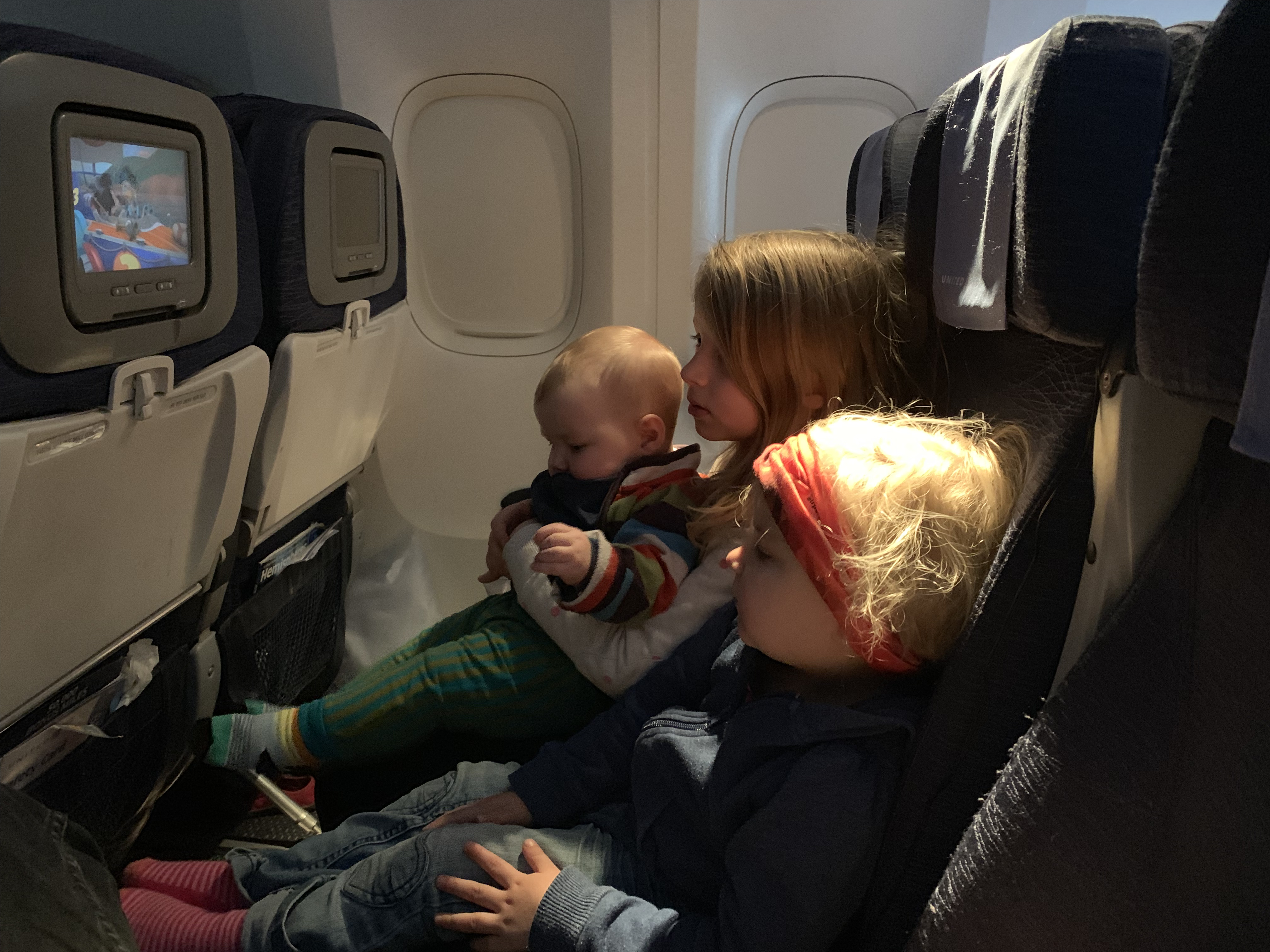Traveling Long Distances with Children

I have four daughters. They are lovely and require lots of attention. No surprise here. Although I try to be a very involved father and probably spend more time with them than most fathers because of my unusual work schedule, I don’t feel qualified to throw around parenting advice like nothing.
Except in one area. Traveling.
We, as a family, go on holidays quite a lot. There were my 28 EU capital marathons during the last seven years, there is our family connection in South Africa and there’s our strong bond to the country of New Zealand and a few certain special people down there.
Unfortunately, these travels still create a CO2 footprint for us comparable to a whole street of people. We need to build a small forrest to offset it, probably. Or invest in some renewable technology airplanes. That would be nice.
Anyways. After traveling around the world with small children over and over again, I had no chance but to end up with some practiced knowledge, ready to share.

Relax.
Your own emotional state reflects on that of your kids. If you’re excited about going into a plane, they will be, too. If you’re frightened, guess who might be anxious as well. I have found it to be best to go into this mental state of simple acceptance when (not if!) something unforeseen happens. Kid falls asleep at the wrong time, cries, needs anything? Just make your peace with it and carry the consequences.
Lower your expectations.
This has worked really well. If you go on an 8 hour flight expecting your kid to cry for at least 2 hours, you’ll touch ground happy if the little one just cried for 30 minutes instead of four times the amount. Expect a kid eventually catches a bug on a flight and goes through twice the amount of diapers than usual on board. If it doesn’t, big relief!
Plenty of extra time.
Especially on a long journey, kids have to function at specific times. Standing in line for a while, putting their stuffed animals through the security scanners, keeping a fastened seatbelt when the lights are on, leave the seat in front alone. But kids are kids. Sometimes they don’t want to do that. They want to run around, explore, play. So make sure to include one or even two extra hours at the arrival on the airport, and/or in the airports during stop-overs for them to just be kids. Airports are exciting. Go explore and play with them.
Explain everything.
This goes without saying, after all it’s the most basic task every parent has to fulfill. To kids, flying is a mystery. Try and explain all the things you’re experiencing. Read up on them beforehand. The more knowledge you can share, the calmer you and your kids will be.
Focus on your kids.
In the plane, it’s your job to entertain your children. Yours alone. Especially if they are having a hard time for a while. Everybody around you certainly knows this, so forget about watching a movie whole or continuing to read your book. Make your kids’ well-being a top priority and all will be fine. This works especially well if you remember to:
Bring snacks, books, toys.
Sure, the entertainment systems on planes usually do a good enough job at keeping kids of a certain age occupied. But they don’t work well for kids whose attention span or ability to focus isn’t developed yet. If you have an infant, this is obviously no option. In my experience, kids up to the age of 3 to 4 aren’t really ready for constant TV on the plane. The won’t get most of it and are a lot happier with their favorite toys from home, some tickle fights, listening to a known book you’re reading to them, and similar things. The older, the less of this they will need.
Also, a box of pre-cut veggies like cucumber, capsicum, or carrots go a long way. Whatever it is that’s a change up of things usually gets them interested, at least in our experience. And if all else fails, a secret backup package of sweets has the power to safe the day and you lots of nerves.
Drink water.
Make them drink water as often as possible, never mind the increase of restroom visits. Due to the dry air in airplanes, hydration is a top priority for everyone, especially kids. Don’t hesitate to ask the flight attendants for those extra cups.
Make it as much like home for them as possible.
Don’t make them sleep when they can’t, don’t make them stay up when they’re too tired either. They will find their rhythms, even after huge timezone changes. Kids are better at this than adults. Explain the flight and timezones and suggest to them when to sleep and when not to. But if they won’t follow that, it’s fine. This is how they learn.
Whatever stresses you, will indirectly stress the kids. Try to relax and be calm even in difficult situations. It’s what pilots do, too!
This in no way claims completeness. I just hope to give some useful hints and tricks to you – as well as looking for advice you seem is missing. Don’t hesitate to contact me so we can make this list better.
How do you feel after reading this?
This helps me assess the quality of my writing and improve it.
Leave a Comment